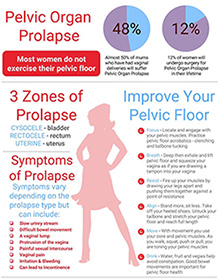Pelvic Organ Prolapse
Are you suffering from pain, unusual lumps or general heaviness in the pelvic region? Many women find it difficult to discuss pelvic organ prolapse, fortunately Dr Gailani has extensive experience in this area.
Pelvic organ prolapse or genital prolapse is the term used to describe what happens when the pelvic organs such as bladder, rectum, uterus, urethra or small bowel protrude into the vaginal wall.
The main cause of vaginal prolapse is weakness in the muscles and ligaments that support the vagina, surrounding tissues and organs. Triggers for vaginal prolapse include repetitive straining such as chronic constipation, frequent lifting of heavy objects, chronic cough, menopause, childbirth, previous surgeries in the pelvic area, advanced age, hysterectomy and obesity.
Symptoms
Women with prolapse may have different symptoms depending on the type of prolapse. The signs and symptoms include slow urinary stream, difficulty in bowel movements, a vaginal lump, protrusion of vagina from the body, painful sexual intercourse, vaginal pain, irritation and bleeding.
There are several types of vaginal prolapse conditions including:
- Cystocele: protrusion of the bladder into the vagina
- Rectocele: protrusion of the rectum into the vagina
- Vaginal vault prolapse: protrusion of the top portion of vagina into vaginal canal
- Uterine prolapse: protrusion of the uterus into the vagina
- Enterocele: protrusion of the small bowel into the vagina
Treatment
Dr Gailani offers a variety of surgical and non-surgical procedures to repair the pelvic floor. The treatment varies depending on the type and the severity of prolapse.







